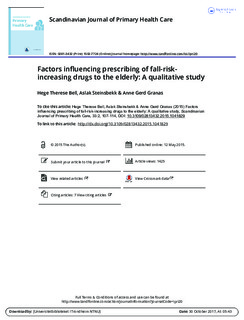Factors influencing prescribing of fall-risk-increasing drugs to the elderly: a qualitative study
Journal article

Åpne
Permanent lenke
http://hdl.handle.net/11250/2445152Utgivelsesdato
2015Metadata
Vis full innførselSamlinger
Originalversjon
Bell, H.T., Steinsbekk, A. & Granas, A.G. (2015) Factors influencing prescribing of fallrisk-increasing drugs to the elderly: a qualitative study. Scandinavian Journal of Primary Health Care, 33(2), s. 107-114. 10.3109/02813432.2015.1041829Sammendrag
Objective. Explore the situations in which GPs associate drug use with falls among their elderly patients, and the factors influencing the prescribing and cessation of fall-risk-increasing drugs (FRIDs). Design. A qualitative study with 13 GPs who participated in two semi-structured focus groups in Central Norway. Participants were encouraged to share overall thoughts on the use of FRIDs among elderly patients and stories related to prescribing and cessation of FRIDs in their own practice. Results. The main finding was that GPs did not immediately perceive the use of FRIDs to be a prominent factor regarding falls in elderly patients, exceptions being when the patient presented with dizziness, reported a fall, or when prescribing FRIDs for the first time. It was reported as common to renew prescriptions without performing a drug review. Factors influencing the prescribing and cessation of FRIDs were categorized into GPs’ clinical work conditions, uncertainty about outcome of changing prescriptions, patients’ prescribing demands, and lack of patient information. Conclusions. The results from this study indicate that GPs need to be reminded that there is a connection between FRID use and falls among elderly patients of enough clinical relevance to remember to assess the patient’s drug list and perform regular drug reviews.
Beskrivelse
Beskriver en studie av hvorvidt fastleger assosierer legemidler med fall blant sine eldre pasienter, og hvilke faktorer som påvirker foreskrivning og seponering av «fall-risikolegemidler».
